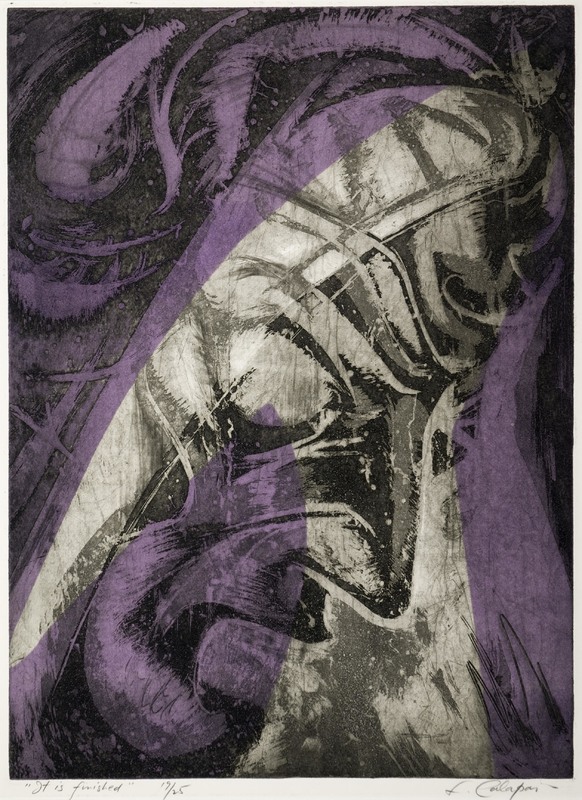It is finished No. 6 from The Seven Last Words of Christ
Item
Title
It is finished
No. 6 from The Seven Last Words of Christ
No. 6 from The Seven Last Words of Christ
Creator
Letterio Calapai
American, 1902–1993
American, 1902–1993
Date
1953-54
Materials
Engraving, etching, and aquatint with stencil
Measurements
Plate: 17-7/16 x 12-3/4 in. (44.3 x 32.4 cm), sheet: 21-1/2 x 17-3/4 in. (54.7 x 45 cm)
Description
Like many of Calapai’s intaglios from the 1950s, the imagery in It Is Finished, masked in part by the use of an additional color stencil, does not immediately reveal itself. Only when the series to which it belongs is known can the viewer somewhat readily match the print’s expressive gestures to the visage of Christ. The sheet’s title further identifies it as representing the sixth of Christ’s final words—phrases, actually—that he is said to have uttered on the cross. In a theological context, the expression is often interpreted as an indication that with the death of Jesus, humankind’s debt to God, born of the fall of Adam and Eve, had been satisfied, thus reopening the gates of Heaven for all who are worthy.
When Calapai produced The Seven Last Words of Christ, he was serving as head of the department of graphics in the Albright School of Art at the University of Buffalo, a department he was invited to establish in 1949 upon the recommendation of S. W. Hayter. He moved back to New York in 1959. There he set up the Contemporaries Graphic Art Center, later renowned as the Pratt Graphics Center, and taught printmaking at the New School for Social Research and New York University. In 1965, Calapai was lured to the Chicago campus of the University of Illinois, and a few years later he set up a private studio in Glencoe, just north of Chicago, where he worked for his remaining years.
When Calapai produced The Seven Last Words of Christ, he was serving as head of the department of graphics in the Albright School of Art at the University of Buffalo, a department he was invited to establish in 1949 upon the recommendation of S. W. Hayter. He moved back to New York in 1959. There he set up the Contemporaries Graphic Art Center, later renowned as the Pratt Graphics Center, and taught printmaking at the New School for Social Research and New York University. In 1965, Calapai was lured to the Chicago campus of the University of Illinois, and a few years later he set up a private studio in Glencoe, just north of Chicago, where he worked for his remaining years.
Source
Transfer from The Pennsylvania State University Libraries Print Collection, Warren Mack Memorial Gift
Identifier
2009.38
Rights
This image is posted publicly for non-profit educational uses, excluding printed publication. Other uses are not permitted.

